Top 12 Best Online Reputation Management Tools for 2025
Discover the best online reputation management tools to boost your brand. Find the top options for 2025 and safeguard your online image today!
Posted by
Related reading
10 Voice of Customer Examples You Can Actually Use
Stop guessing. See 10 real voice of customer examples from surveys, social media, and support tickets to find out what your customers actually want.
A Founder's Guide to Analyzing Survey Data
A battle-tested approach to analyzing survey data. Learn how to turn raw feedback into actionable insights that drive real business decisions.
Customer Advisory Board: The Founder's Playbook for Avoiding Catastrophic Mistakes
A practical guide to building a customer advisory board that provides honest insights, validates your strategy, and prevents costly product mistakes.
Alright, let's cut the crap. You think you're listening to customers because you skim a few reviews or glance at a survey dashboard. That's not listening; that's LARPing as a founder who's 'customer-centric.' The brutal truth is your customers are screaming at you everywhere: in App Store rants, on niche forums, in angry support tickets, and in passive-aggressive tweets. Most of it is noise. But buried in that mess are the insights that will either make you millions or bankrupt you. Your job isn't to read it all. It's to find the signal in the noise before your competitor does. Ignore your customers, and you’ll be lucky to survive the quarter.
This isn't just about managing bad reviews. It's about systematically mining customer feedback for product gold, competitive intel, and operational weaknesses. That requires more than just manual skimming; it requires a dedicated tech stack. For a deeper dive into controlling your brand's narrative online, this comprehensive guide to social media reputation management provides a solid tactical foundation.
This list cuts through the marketing fluff to give you a battle-tested breakdown of the best online reputation management tools available today. We’ll show you exactly which platform to use whether you're a SaaS founder, a restaurant operator, or a digital agency, complete with screenshots and direct links. This is the stack I’d use if I were starting over today, designed to find the truth without wasting a single second on corporate busywork. Let's get to it.
1. Backsy.ai
If you think reputation management is just about monitoring social media mentions, you’re playing a losing game. True brand perception is shaped by what customers say when they aren't performing for a public audience. Backsy.ai is a standout choice among online reputation management tools because it targets the root of brand health: raw, unfiltered customer feedback. It bypasses the sterile, leading questions of traditional surveys and captures the "why" behind customer sentiment.
This isn’t just another feedback form. Backsy.ai is an AI-powered analysis engine designed to collect unstructured comments via text or voice and translate that chaos into a clear roadmap. It’s built for founders and product teams who know their next big breakthrough is buried in customer complaints and off-hand compliments, not in a 1-to-5 star rating. By letting customers speak freely, you get the kind of honest, brutal feedback that actually sparks innovation.
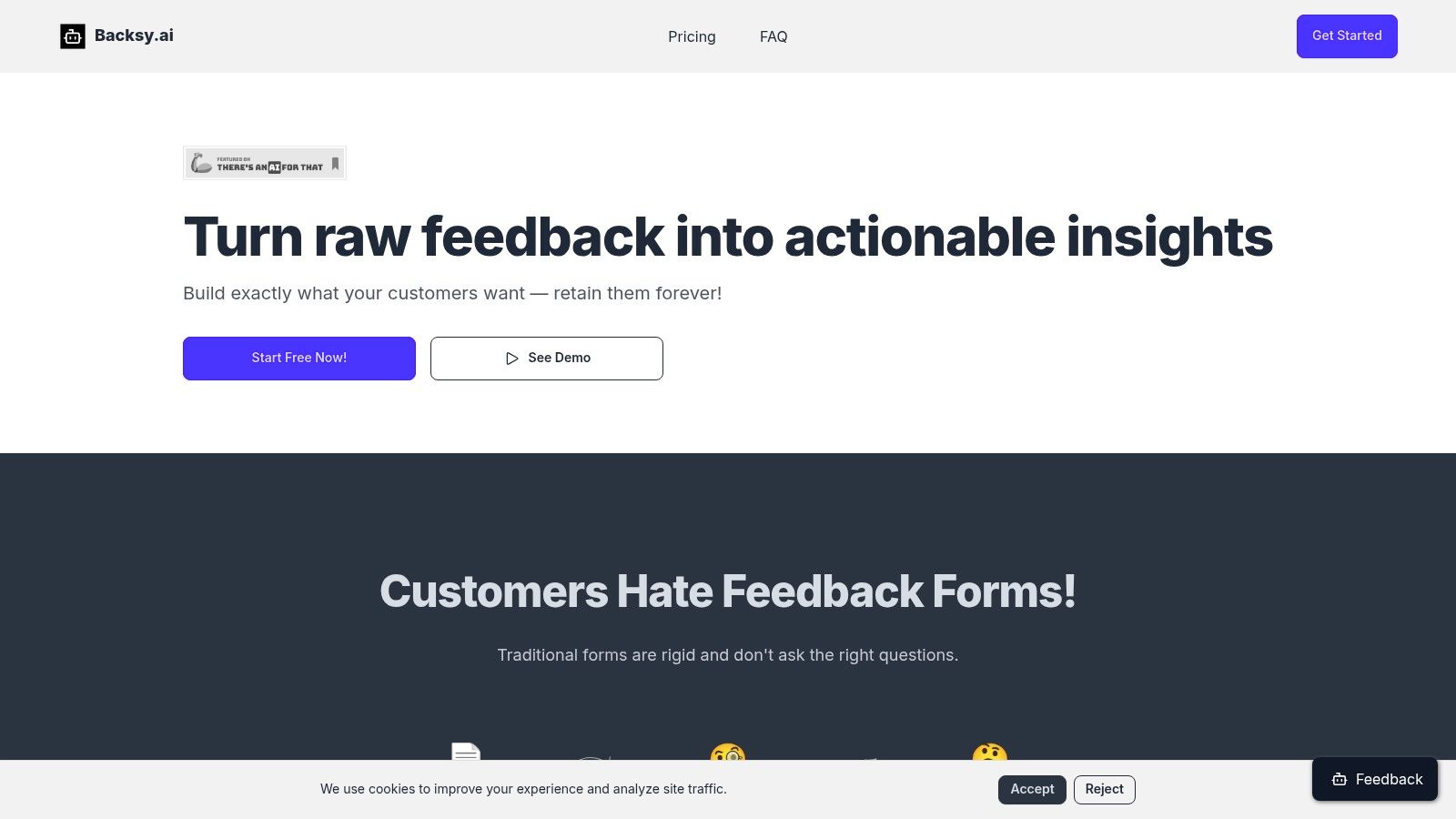
Why Backsy.ai is a Top Choice
What makes Backsy.ai exceptional is its focus on signal over noise. The platform’s AI automatically filters out spam, emoji-only replies, and irrelevant chatter, ensuring your team only analyzes high-quality, substantive feedback. It then groups this data into actionable themes, identifying what customers love, hate, or need without requiring hours of manual sorting.
For reputation management, this provides a powerful leading indicator. Before a negative sentiment spills onto public review sites, it surfaces here. You can identify patterns in complaints, address friction points in your user experience, and even discover unexpected use cases for your product.
Core Strength: Backsy.ai moves reputation management from a reactive, damage-control function to a proactive, product-improvement strategy. It helps you fix the core issues before they become public reputation problems.
Key Features & Use Cases
- Unstructured Feedback Collection: Let customers leave feedback via text or voice without the constraints of a rigid form. This encourages longer, more authentic responses.
- AI-Powered Analysis: The platform automatically tags themes, sentiment, and trends. You can instantly see if a recent feature release is causing frustration or if a new service is a hit.
- Centralized Feedback Hub: Aggregate comments from multiple channels with a single click, creating one source of truth for all customer voice data.
- Actionable Dashboards: The interface presents insights in a clean, intuitive way, making it easy for non-technical teams to understand and act on the data.
Pricing: Backsy.ai operates on a flexible, credit-based system with a "Free Forever" plan, making it accessible for startups and small projects. Paid plans offer more credits for feedback analysis, catering to higher-volume needs without locking you into a long-term contract.
Takeaway: Stop guessing what your customers think and start building your product and reputation based on what they actually say.
Pros:
- Captures honest, pressure-free feedback via text or voice.
- AI-powered filtering removes spam for high-quality insights.
- Organizes feedback into clear, actionable dashboards.
- Flexible pricing with a free forever plan.
Cons:
- Credit system may require monitoring for very high-volume users.
- Feedback entries cannot be deleted to preserve data integrity.
Website: https://backsy.ai
2. Birdeye
Birdeye isn't just a review generation tool; it's an end-to-end customer experience engine built for businesses that live and die by their local reputation. If you manage multiple physical locations, ignoring a platform like this is a surefire way to get buried by competitors who are actively farming reviews and managing their local listings. Birdeye consolidates everything from review monitoring across 200+ sites to social media publishing into a single, unified inbox.
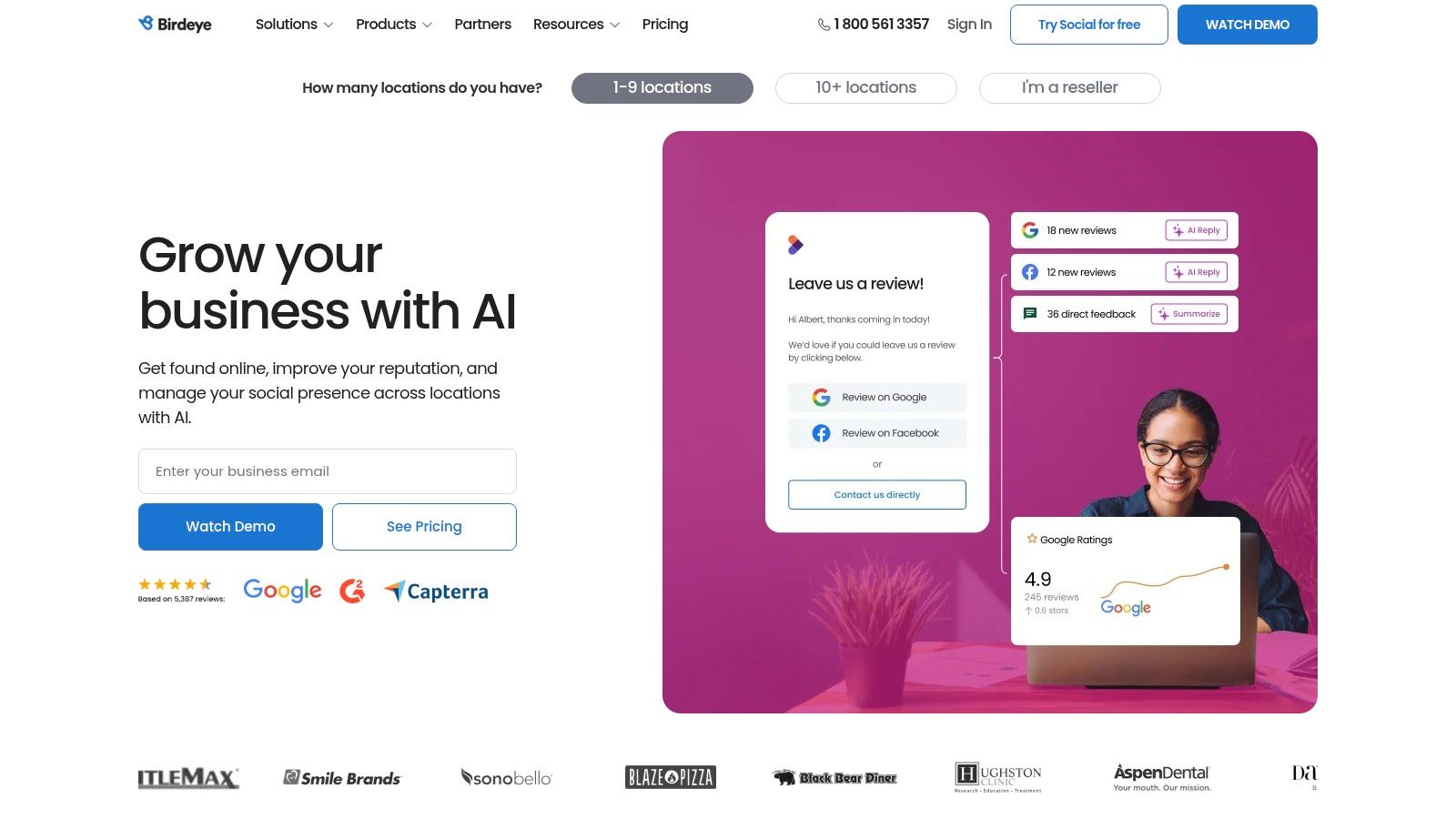
What sets it apart is its aggressive integration of AI. Its "Reviews AI" doesn't just monitor feedback; it drafts intelligent, on-brand replies, cutting down manual response time significantly. For multi-location franchises, its "Listings AI" syncs business information across directories and even automates Google Business Profile verification, a notorious pain point. This makes Birdeye one of the best online reputation management tools for scaling brands focused on US local SEO.
Key Features & Use Case
- Best For: Multi-location businesses, local service providers, and healthcare networks.
- AI-Powered Responses: Automatically drafts replies to customer reviews, which you can then approve or edit. This saves countless hours, especially for brands with high review volume.
- Unified Communications: Manages reviews, social media mentions, webchat, and surveys from one dashboard and mobile app.
- Listings Management: Ensures accurate and consistent business information across a vast network of online directories.
Pricing & Limitations
Pricing is quote-based and customized to your business size and needs, typically placing it in the mid-tier cost range. While incredibly powerful, its extensive feature set might be overkill for a solo entrepreneur who just needs a simple tool to request reviews via SMS. The interface is robust but can present a steeper learning curve than simpler alternatives.
Visit the website: https://birdeye.com
3. Reputation (formerly Reputation.com)
Reputation is the enterprise-grade behemoth in the online reputation management space, built for complex organizations that need more than just review monitoring. This is not a tool for a local coffee shop; it’s a customer experience (CX) platform for large franchises, healthcare systems, and automotive groups managing hundreds or thousands of locations. It unifies reviews, social media, surveys, and business listings into a single ecosystem, giving corporate teams a bird's-eye view while empowering local managers.
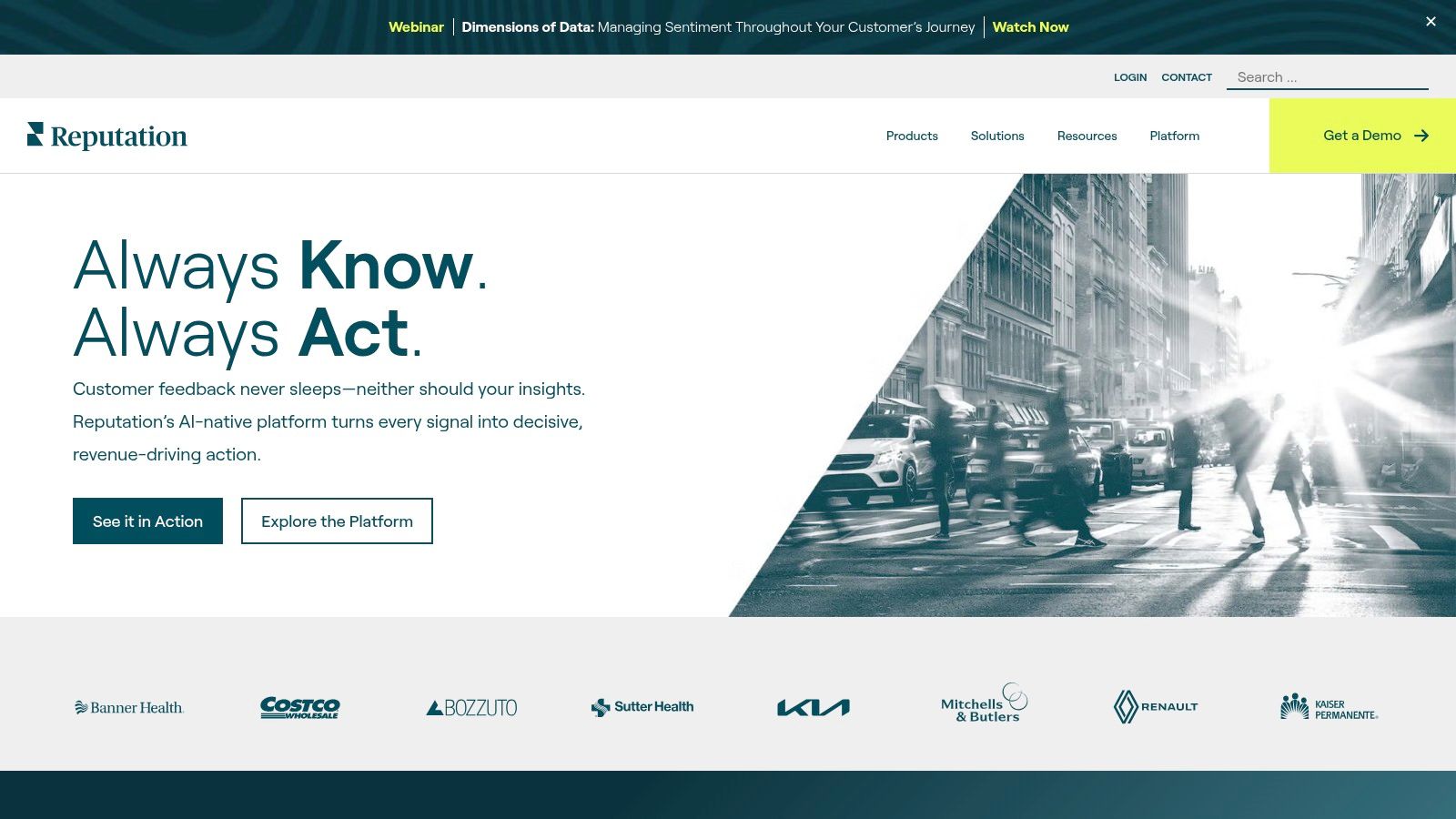
What truly distinguishes Reputation is its proprietary Reputation Score, a real-time benchmark that grades your performance against competitors and industry standards. This metric transforms vague "reputation" into a tangible KPI. The platform’s deep analytics connect customer feedback directly to business outcomes, offering prescriptive insights on where to focus improvement efforts, from operational changes to staff training. For large-scale operations, this is one of the best online reputation management tools for turning feedback into measurable business intelligence.
Key Features & Use Case
- Best For: Large multi-location enterprises in sectors like retail, healthcare, automotive, and hospitality.
- Reputation Score: A proprietary, data-driven metric that calculates a 0-1000 score, providing a comprehensive benchmark of your brand's health against competitors.
- Unified CX Platform: Consolidates reviews, social listening, surveys, and business listings data into one dashboard with robust reporting.
- Advanced Governance: Features granular user roles and permissions, ticketing, and workflows designed for the complexities of a large, distributed team.
Pricing & Limitations
Pricing is quote-based and tailored for enterprise clients, requiring annual contracts that place it at the premium end of the market. The platform's complexity, while a strength for large organizations, can be overwhelming and cost-prohibitive for smaller businesses or those without a dedicated management team. The implementation process is more involved than simpler tools, demanding a strategic approach.
Visit the website: https://www.reputation.com
4. Podium
Podium shifts the focus from passively monitoring reputation to actively driving it through text-based conversations. It’s built on a simple premise: your customers are on their phones, so you should be too. If your local service business struggles with email open rates for review requests, Podium’s SMS-first approach is designed to cut through the noise and get immediate responses. It combines review generation, webchat, and even payment processing into a single, text-centric inbox.
What makes Podium a standout among online reputation management tools is its laser focus on converting website traffic into text conversations. Its AI-powered concierge engages visitors, captures leads, and funnels them directly to your team’s SMS inbox. This transforms your website from a static brochure into an interactive lead-gen machine, making it incredibly effective for businesses like auto repair shops, home services, and healthcare clinics where a quick response wins the customer.
Key Features & Use Case
- Best For: Local service businesses, healthcare providers, and retailers who want to increase Google reviews and capture leads via SMS.
- SMS-First Communication: Sends review invites via text, dramatically increasing response rates compared to email. Manages all customer interactions in one thread.
- AI Concierge: An AI-powered webchat that captures leads 24/7, answers common questions, and schedules appointments automatically.
- Unified Inbox: Consolidates messages from Google, Facebook, Instagram, and your website into one place for streamlined management.
Pricing & Limitations
Podium uses quote-based pricing that is customized for each business, generally falling into the mid-to-high tier range. While its text-first strategy is highly effective for review volume, it’s a premium tool. Some users have reported mixed experiences with contract terms and customer support responsiveness. Its powerful but focused feature set may be less suitable for brands managing a complex, multi-channel social media presence.
Visit the website: https://www.podium.com
5. Yext
Yext built its empire on listings management, but ignoring its advanced reputation features is a mistake. For multi-location enterprises, Yext acts as the single source of truth, ensuring your brand's core data is locked down and consistent everywhere online. It then layers powerful review monitoring, generation, and analytics on top of that authoritative foundation, creating a comprehensive control center for your brand's digital presence.
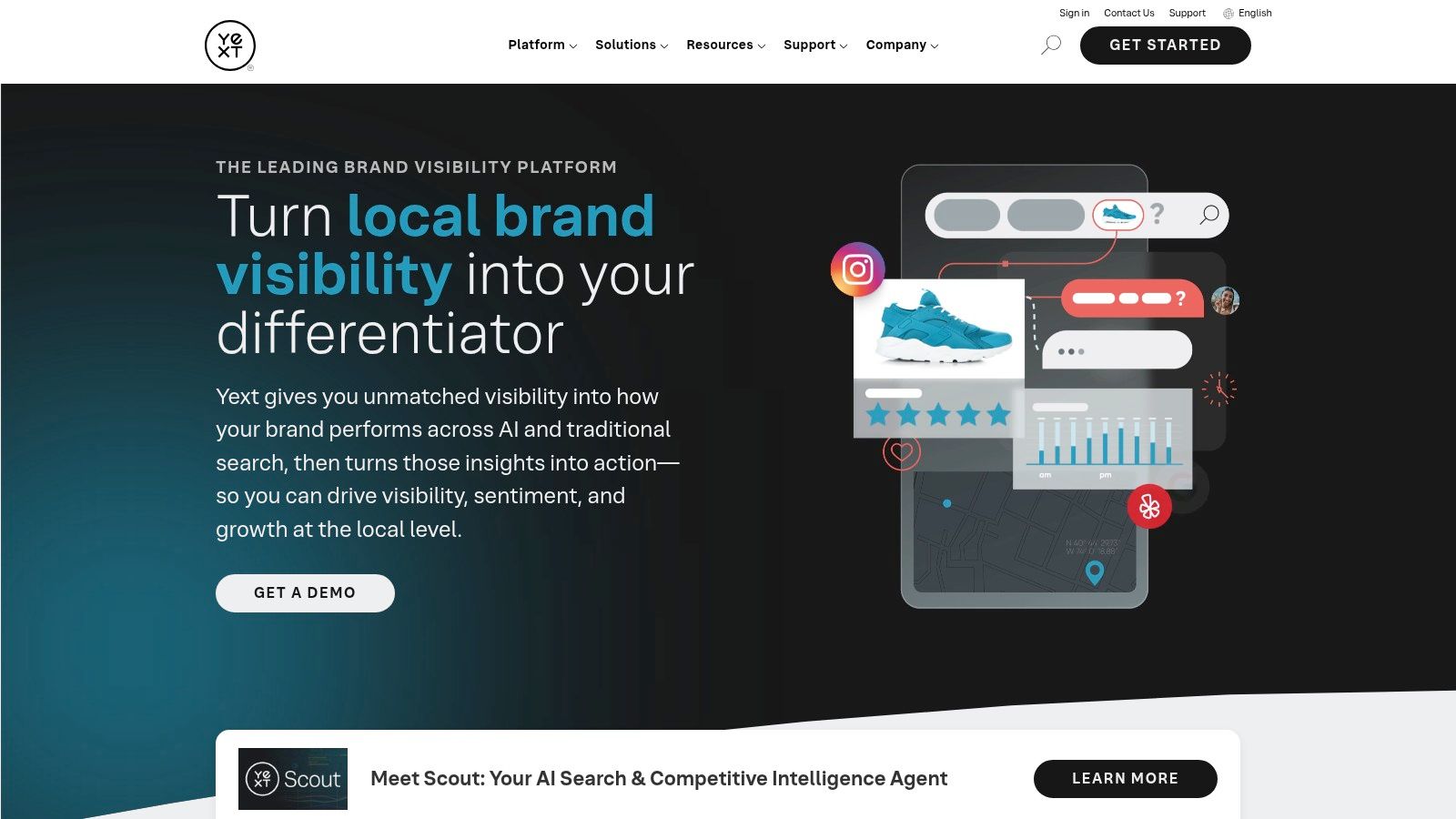
What makes Yext one of the best online reputation management tools is its governance-first approach. While other tools focus solely on engagement, Yext starts with data integrity. Its "Reviews" product integrates sentiment analysis and AI-suggested responses directly into the workflow you already use for managing locations. This synergy is critical for franchise operators or large chains that cannot afford brand dilution or inconsistent customer service from one location to the next.
Key Features & Use Case
- Best For: Enterprise brands, franchises, and businesses with hundreds or thousands of physical locations.
- Listings-First Reputation: Combines authoritative directory synchronization with integrated review monitoring and response workflows.
- AI-Powered Analytics: Uses sentiment analysis to categorize review topics and competitive intelligence to benchmark your performance against others in your area.
- Centralized Control: Provides robust dashboards and permissions to manage brand-wide responses and local manager engagement from one place.
Pricing & Limitations
Yext offers published pricing for its small business listings packages, but its more advanced reputation and analytics suites are quote-based. The total cost can be significant, reflecting its enterprise focus. The platform's primary strength is its listings engine; if your main goal is simply sending review invites via SMS and you don't manage multiple locations, its powerful infrastructure may be more than you need.
Visit the website: https://www.yext.com
6. Sprout Social
Sprout Social is not a reputation tool that bolted on social features; it's a social-first platform that recognized review management is an inseparable part of modern brand engagement. If your team already lives in a social media command center, forcing them into a separate review tool creates a disjointed workflow. Sprout Social elegantly solves this by pulling reviews from Google, Yelp, Facebook, and TripAdvisor directly into its Smart Inbox, placing them alongside tweets and DMs.
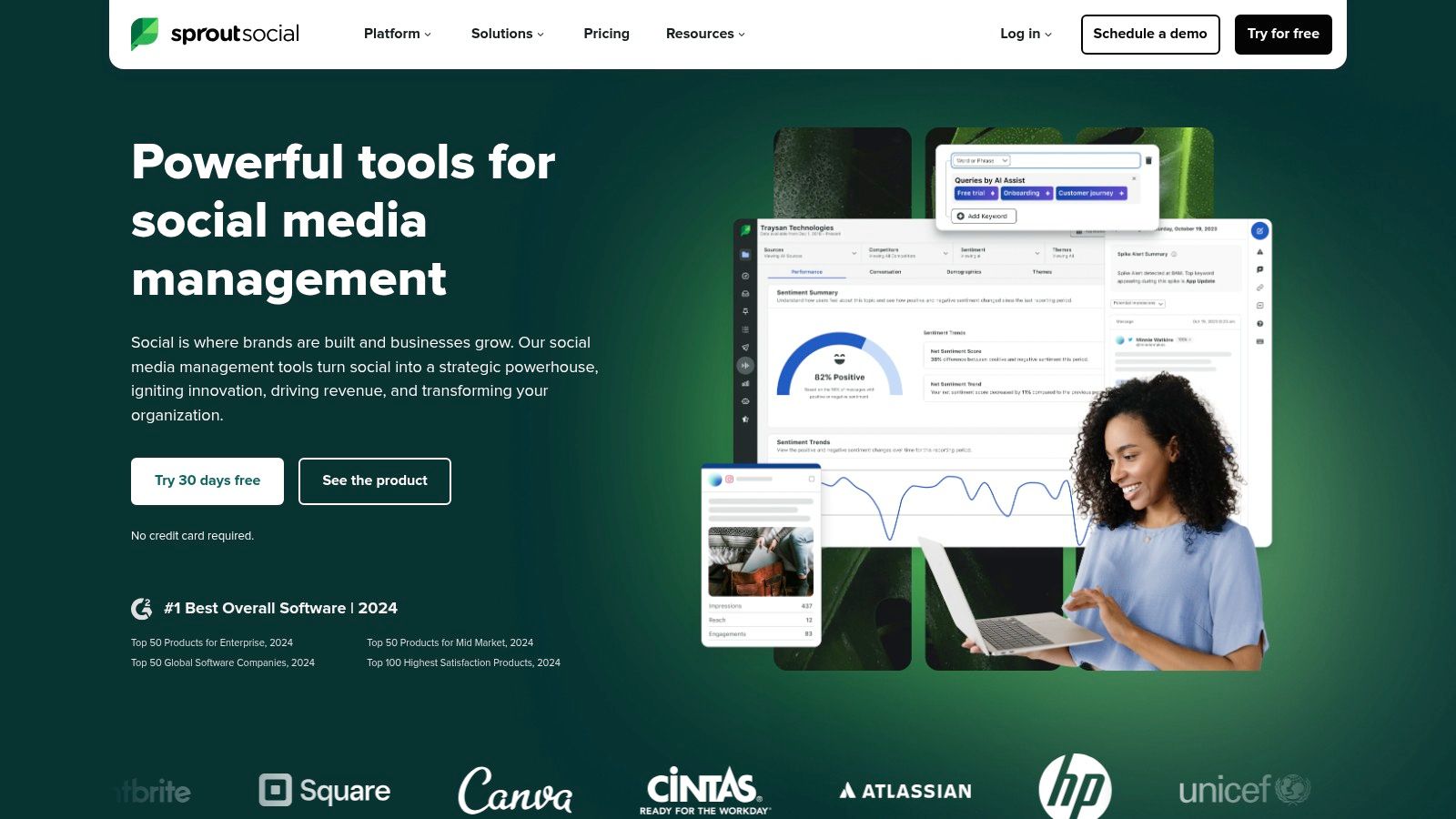
What makes it one of the best online reputation management tools is this unified approach. You can tag, filter, and assign reviews to team members just like any other social interaction, ensuring accountability and preventing feedback from slipping through the cracks. While it lacks the aggressive review generation features of dedicated platforms, its strength lies in consolidating response and analysis, making it a powerhouse for brands where social media is the primary customer communication channel.
Key Features & Use Case
- Best For: Digital-native brands, marketing agencies, and businesses with a strong social media presence.
- Unified Smart Inbox: Manages reviews, social comments, and private messages in one consolidated feed, streamlining team workflows.
- Advanced Reporting: Offers robust analytics on review volume, response times, and sentiment trends across multiple locations and platforms.
- Team Collaboration: Allows users to assign reviews as tasks to specific team members, add internal notes, and track resolution progress.
Pricing & Limitations
Sprout Social offers transparent, per-user pricing, which is a breath of fresh air compared to quote-only models, and includes a 30-day free trial. However, this per-seat cost can quickly become expensive for large teams. While the integration is seamless for most platforms, some, like TripAdvisor, require you to click out to reply natively, adding a minor step. The core focus remains social media, so businesses needing heavy-duty review generation or local listings management may need to supplement it with another tool.
Visit the website: https://sproutsocial.com
7. Brand24
Brand24 isn't about managing your Google Business Profile; it's about casting a wide net across the digital ocean to catch every whisper about your brand, positive or negative. It excels as an affordable, real-time social listening tool that gives you eyes and ears everywhere: social media, news sites, blogs, forums, podcasts, and even the chaotic depths of Reddit and TikTok. For teams that need to detect reputational sparks before they become fires, Brand24 is an essential early-warning system.
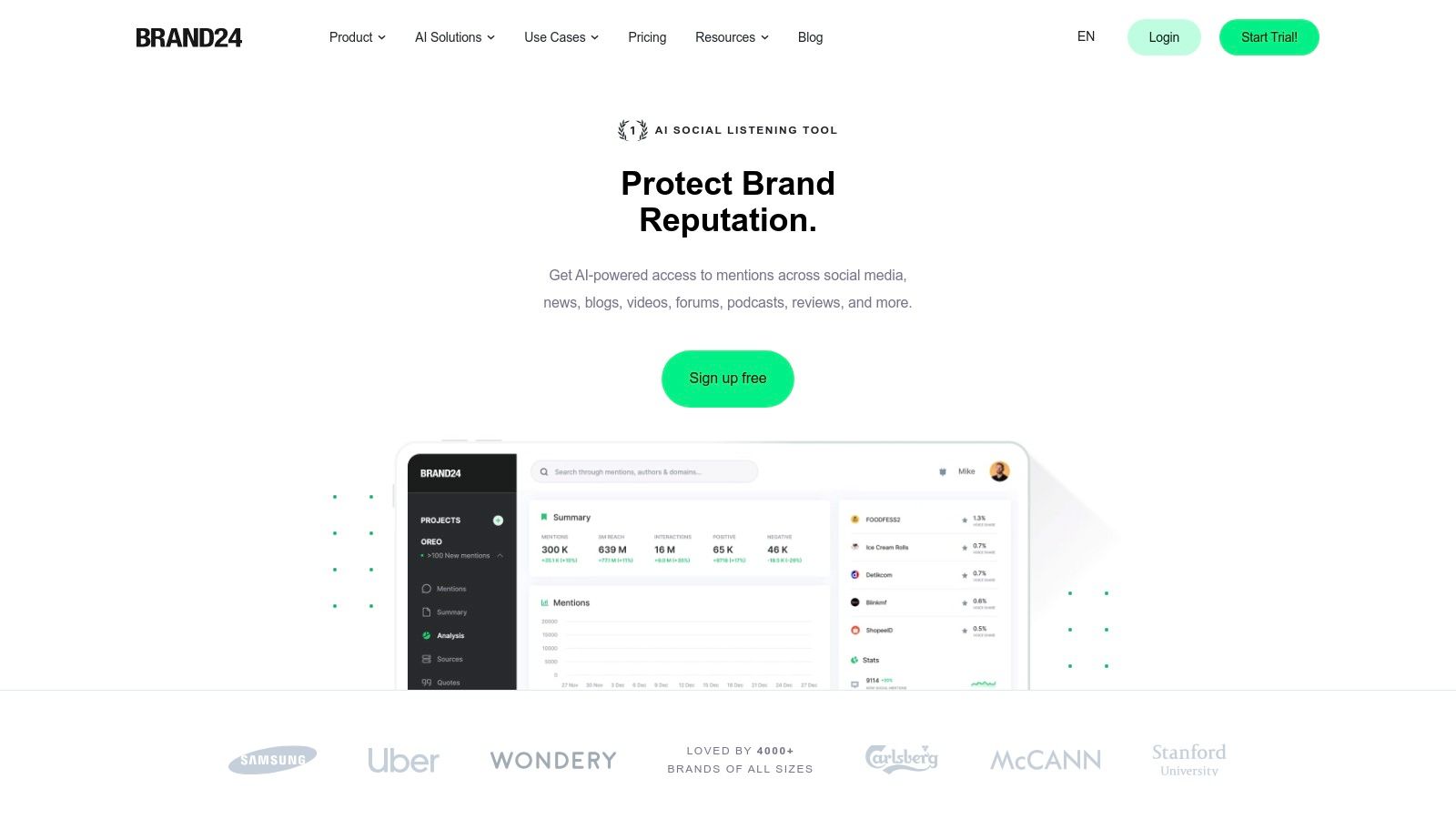
What makes it one of the best online reputation management tools for agile teams is its focus on immediate awareness. Its AI-driven sentiment analysis quickly categorizes mentions, allowing you to prioritize outreach or address negative feedback before it goes viral. It won't help you respond directly within review sites, but it ensures you know the conversation is happening. Understanding the raw, unfiltered voice of the customer is a superpower, and you can learn more about how to harness it with a deeper look into the best customer sentiment analysis tools.
Key Features & Use Case
- Best For: Startups, digital agencies, and consumer brands who need affordable and comprehensive social listening.
- Broad Source Coverage: Monitors mentions across an extensive range of sources including social networks, news outlets, forums, podcasts, and video platforms like TikTok.
- AI-Powered Insights: Uses AI to provide instant sentiment analysis on mentions and automatically generates reports and summaries, saving significant analysis time.
- Real-time Alerts & Integrations: Delivers immediate alerts for new mentions via email, mobile app, or Slack, allowing for rapid response.
Pricing & Limitations
Brand24 offers transparent, tiered pricing starting at a very accessible point, making it great for smaller businesses. Higher-tier plans offer more keywords, a higher mention cap, and white-label reporting for agencies. The primary limitation is that it's a listening-first platform; it’s not designed for direct review response or local listings management. Mention caps on each plan mean high-volume brands need to budget accordingly.
Visit the website: https://brand24.com
8. Brandwatch
Brandwatch isn't for dabblers; it's an enterprise-grade social listening command center built for global brands that need to make sense of billions of online conversations. While others track reviews, Brandwatch ingests a firehose of data from social media, forums, and blogs to deliver high-level consumer intelligence. Ignoring this level of insight means you're flying blind, making strategic decisions based on gut feelings while your competitors are using data to predict market shifts and preempt PR crises.
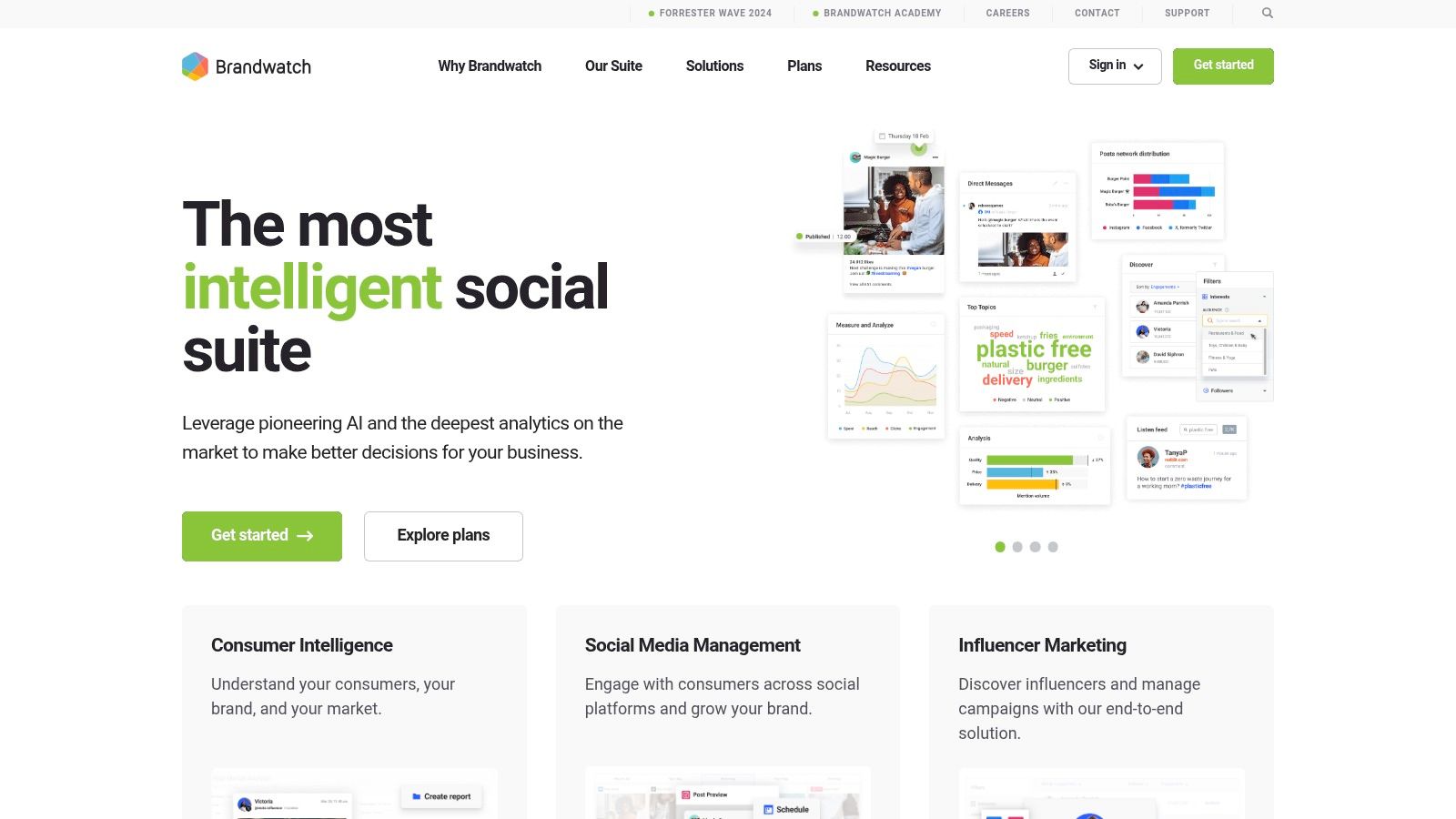
What makes it one of the best online reputation management tools for large-scale operations is its sheer analytical depth. Its AI-powered platform moves beyond simple keyword mentions, identifying sentiment, key themes, and demographic trends in real-time. For a consumer goods brand launching a new product, this means instant feedback on campaign messaging and public perception, allowing for agile adjustments. This isn't just reputation monitoring; it's proactive brand stewardship on a global scale.
Key Features & Use Case
- Best For: Enterprise-level corporations, consumer goods brands, and agencies managing major international clients.
- AI-Powered Consumer Intelligence: Drills down into massive datasets to provide actionable insights on audience sentiment, trends, and competitive intelligence.
- Real-Time Crisis Management: Spike detection and custom alerts notify you of unusual conversation volume, helping you get ahead of a negative story before it explodes.
- Modular Suite: Offers separate but integrated products for social listening (Consumer Intelligence), social media management (Social Media Management), and influencer marketing.
Pricing & Limitations
Brandwatch operates on a premium, quote-based pricing model with annual contracts, placing it firmly in the enterprise budget category. The platform's immense power and complexity can be overwhelming and cost-prohibitive for SMBs or startups that just need to manage their Google Business Profile reviews. The value is in the deep analytics, which requires a dedicated analyst or team to fully leverage.
Visit the website: https://www.brandwatch.com
9. ReviewTrackers
ReviewTrackers is for the business that obsesses over customer feedback and understands reviews are a direct line to revenue. It’s not trying to be an all-in-one marketing suite; it’s a laser-focused platform built to aggregate, analyze, and act on customer reviews from over 100 sources. If your growth strategy hinges on understanding what customers are saying-and proving it with public feedback-then ignoring a specialist like this means you’re flying blind. It excels at delivering timely alerts and providing clear, actionable insights through its clean dashboard.
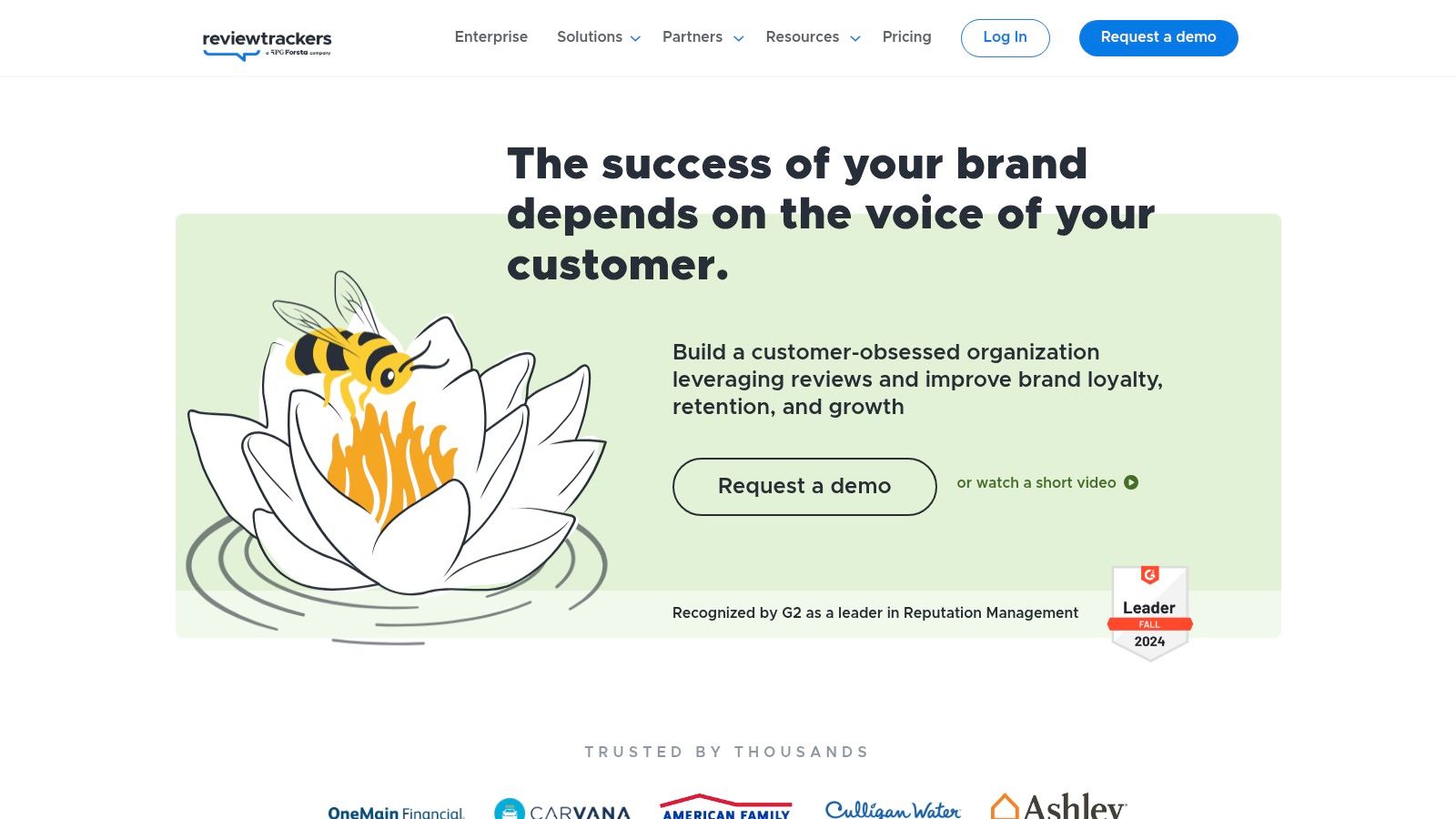
What makes ReviewTrackers a powerful contender among the best online reputation management tools is its commitment to review data. Its "SmartResponse" feature uses AI to suggest on-brand replies, while its text analytics uncover sentiment and key trends hidden within thousands of comments. This is crucial for multi-location businesses in sectors like healthcare or retail, where identifying a recurring issue at a specific branch can prevent a wider crisis. The platform also offers public-facing "Amplify" pages, turning your stream of positive reviews into a marketing asset.
Key Features & Use Case
- Best For: Multi-location SMBs, mid-market brands, and franchises in healthcare, retail, and hospitality.
- Deep Review Analytics: Tracks over 100 review sites and provides mobile alerts so you never miss critical feedback. Its text analytics help you spot trends across all locations.
- Competitor & Sentiment Tracking: Monitor your competitors’ review performance and benchmark your own, identifying their weaknesses and your opportunities.
- Review Widgets & Surveys: Embed positive reviews directly onto your website to build social proof and launch targeted customer experience surveys.
Pricing & Limitations
Pricing is on a per-location basis, often starting around $89/month for each, which can scale quickly for larger franchises. While its focus on reviews is a strength, some users may find its automation capabilities or integrations with broader marketing platforms less extensive than all-in-one solutions. It’s a specialist tool, meaning you might need other software for social media management or comprehensive listings optimization.
Visit the website: https://www.reviewtrackers.com
10. SOCi
SOCi isn't for the faint of heart or the single-location shop; it’s an enterprise-grade command center built for multi-location marketing at a massive scale. If you're a franchise or a national chain, trying to manage brand consistency across hundreds of local social pages, listings, and review sites is a recipe for disaster. SOCi centralizes this chaos, offering a suite of tools for localized social media, listings, ads, and, crucially, reputation management.
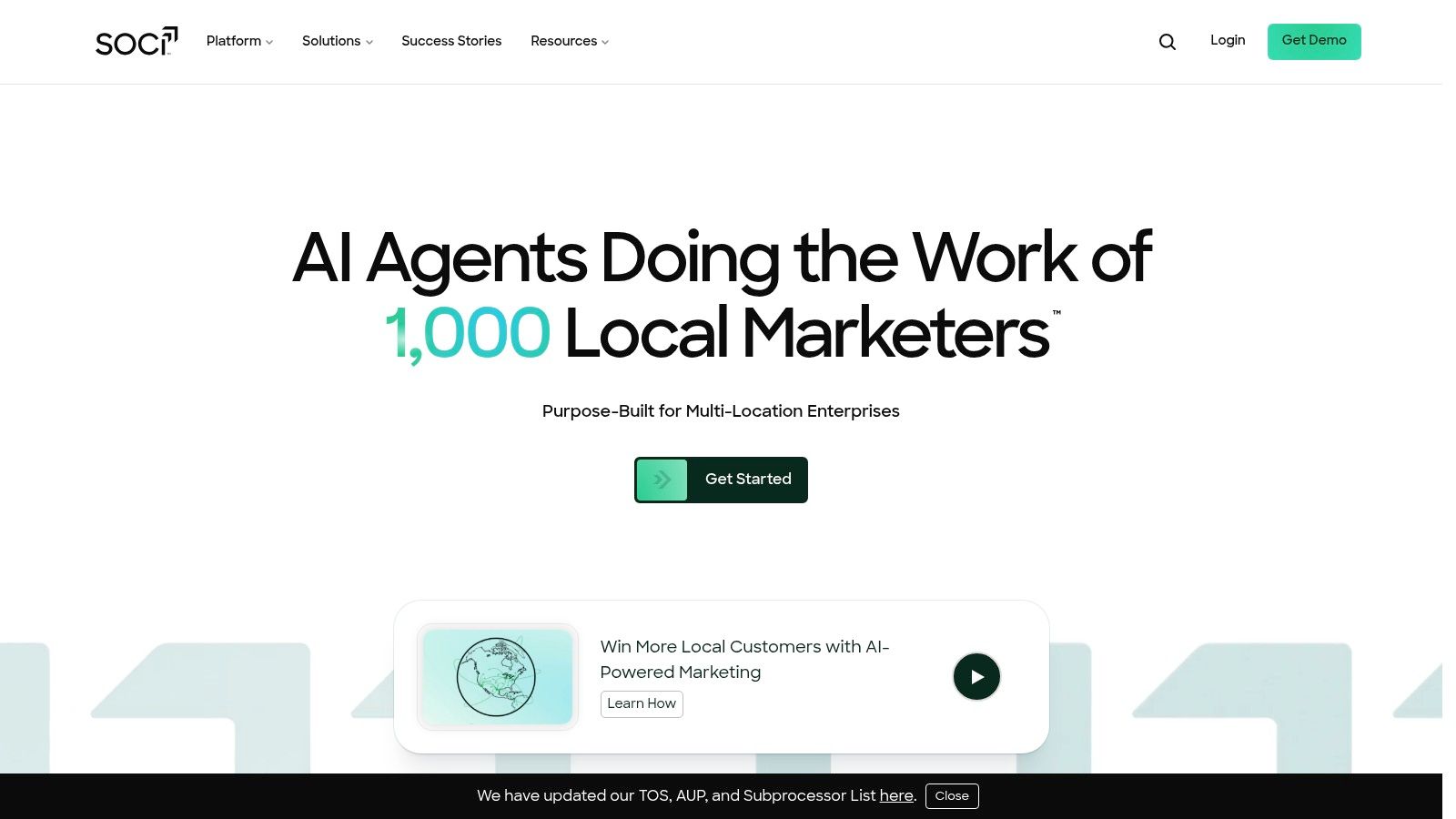
What makes SOCi one of the best online reputation management tools for large organizations is its focus on governance and workflow. Corporate can set brand-approved templates for review responses while still allowing local managers to personalize them, preventing off-brand replies. Its integration with ChatGPT for AI-assisted review responses is built with this enterprise hierarchy in mind, ensuring scalability without sacrificing control. By consolidating multiple marketing channels, it also provides robust reporting for both corporate and local stakeholders.
Key Features & Use Case
- Best For: Enterprise brands, national franchises, and multi-location property management companies.
- Centralized Review Management: Monitor and respond to reviews from a single dashboard with multi-level approval workflows to maintain brand safety.
- AI-Powered Response Generation: Uses AI to draft brand-consistent replies, significantly speeding up response times for high-volume locations.
- Comprehensive Marketing Suite: Goes beyond reviews to include social media management, local pages, and localized advertising tools. SOCi’s ability to gather and act on local feedback at scale makes it one of the most powerful platforms available; learn more about how SOCi leverages customer feedback across its entire suite.
Pricing & Limitations
SOCi’s pricing is entirely quote-based, requiring a demo and custom contract, placing it firmly in the premium enterprise tier. The sheer breadth of its feature set is its greatest strength but also its main limitation; it's significant overkill and too complex for a small or single-location business that just needs to manage its Google reviews.
Visit the website: https://www.meetsoci.com
11. NiceJob
NiceJob is built for the local service business that needs to turn happy customers into a marketing engine without hiring a full-time staff member. It strips away the enterprise-level complexity and focuses on one core mission: getting more reviews and using them to attract new business. If you're a plumber, landscaper, or contractor, this is your low-effort, high-impact tool for building social proof and dominating local search results.
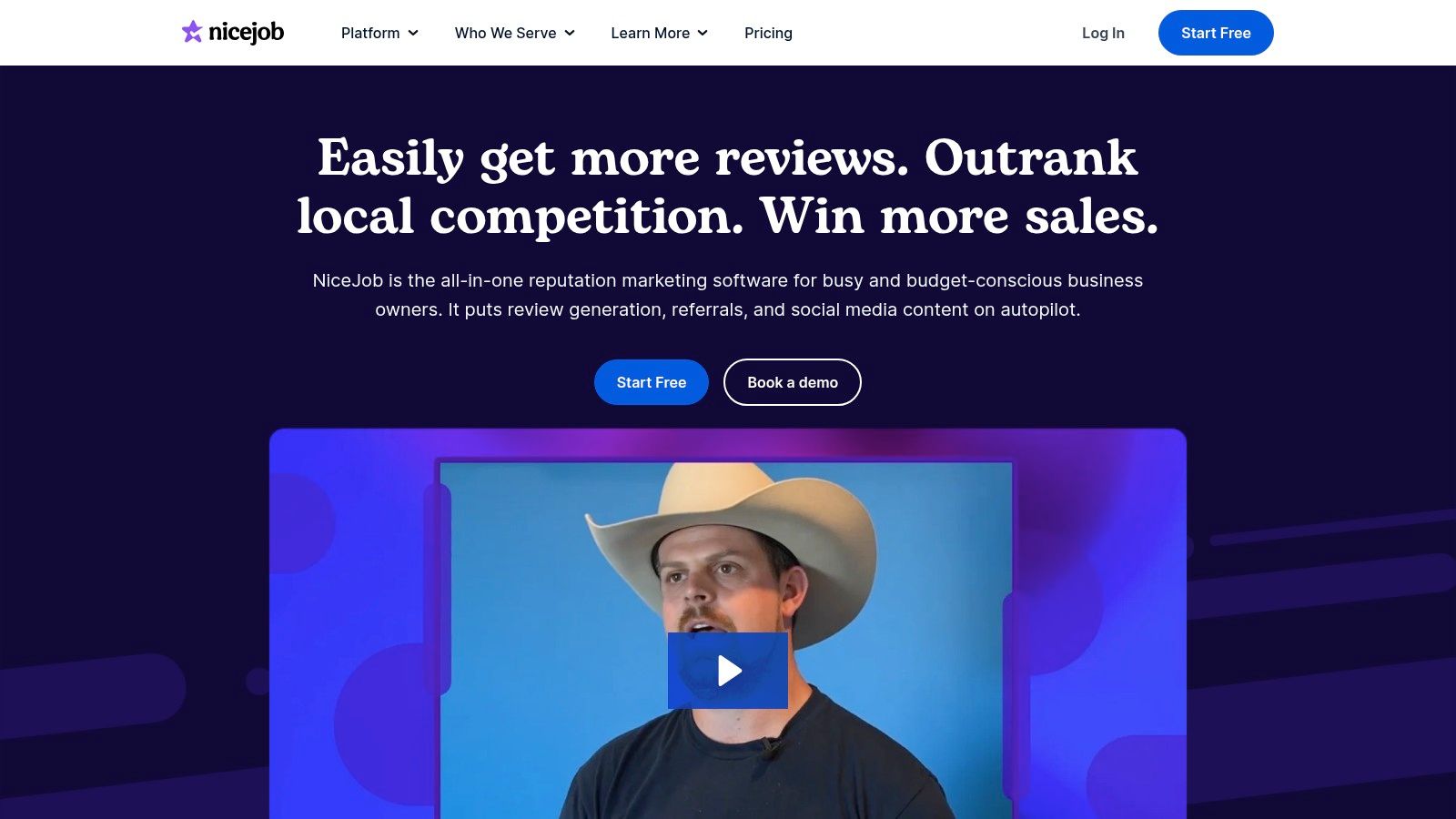
Its brilliance lies in its simplicity and automation. Instead of complex dashboards, you get a streamlined process that sends intelligent, personalized review requests via SMS and email. What truly sets it apart is its "Stories" feature, which automatically turns your best reviews into shareable social media content. This creates a flywheel where great service leads to reviews, which become marketing assets, which in turn drive more business. It’s one of the best online reputation management tools for small businesses that value transparency and quick results.
Key Features & Use Case
- Best For: Local home service businesses, contractors, and any SMB focused on generating reviews to fuel growth.
- Automated Review Capture: Set up automated, multi-step campaigns to ask customers for feedback and guide them to the review sites that matter most to you.
- Social Proof Widgets: Easily embed your best reviews and customer photos directly onto your website to increase conversion rates.
- Referral Campaigns: Includes tools to automate referral requests, turning your happiest customers into a source of new leads. For an in-depth guide, explore how to get customer feedback.
Pricing & Limitations
NiceJob offers transparent, affordable monthly pricing with a 14-day free trial, a refreshing change from the quote-based models common in the industry. Implementation is fast, often taking less than an hour. However, it's not a full-service listings manager, so you won't be using it to sync your NAP data across 100+ directories. Its analytics are also lighter than enterprise-grade platforms, focusing more on review volume and conversion than deep sentiment analysis.
Visit the website: https://get.nicejob.com
12. G2 (Online Reputation Management category)
G2 isn't a tool itself; it’s the ultimate meta-resource for finding the right tool. Think of it as the Kelley Blue Book for software. Before you commit thousands to a platform based on a slick sales demo, G2 gives you unfiltered, verified user reviews and head-to-head comparisons. Wading through vendor marketing fluff is a recipe for buyer’s remorse; G2 cuts through it by showing you what actual users think, warts and all. It’s an indispensable first step in the research phase for any serious buyer.
This platform shines by letting you filter the entire market by company size, user satisfaction scores, and specific features. You can build a shortlist of the best online reputation management tools in minutes, not days. Instead of booking a dozen demos, you can quickly identify the top three contenders that genuinely fit your business needs and budget, saving you from a vortex of sales calls and follow-up emails.
Key Features & Use Case
- Best For: Any business leader or marketing manager in the research phase of buying ORM software.
- Verified User Reviews: Access a deep well of feedback from real users, providing practical insights you won't find on a vendor’s website.
- Side-by-Side Comparisons: Directly compare features, pricing models, and satisfaction ratings of multiple platforms on a single screen.
- Category Grid Reports: Visualize the market landscape with G2’s "Grid," which plots tools based on market presence and customer satisfaction.
Pricing & Limitations
Using G2 for research is completely free. However, a key limitation is that its rankings and "Leader" boards can be skewed toward vendors who actively solicit reviews, potentially overshadowing newer or niche tools. Additionally, pricing information is often user-reported or estimated, so you should always get a direct quote from the vendor for accuracy.
Visit the website: https://www.g2.com/categories/online-reputation-management
Top 12 Online Reputation Management Tools Comparison
| Platform | Core Features / Capabilities | User Experience & Quality ★ | Value Proposition 💰 | Target Audience 👥 | Unique Selling Points ✨ |
|---|---|---|---|---|---|
| Backsy.ai 🏆 | AI-driven feedback analysis from text & voice, multi-channel | Honest, pressure-free feedback ★★★★ | Free forever plan + flexible pricing 💰 | SMBs to enterprises, cross-industry 👥 | Natural language processing, single-click aggregation, contributor rewards ✨ |
| Birdeye | Reviews AI, listings sync, messaging, social & chatbot AI | Broad AI toolkit, multi-location ★★★ | Quote-based, mid-tier cost 💰 | Multi-location local businesses 👥 | Extensive Yelp & CRM integrations ✨ |
| Reputation (formerly Reputation.com) | Review monitoring, surveys, sentiment & benchmarking | Enterprise-grade, robust analytics ★★★★ | Annual contract, pricing not public 💰 | Large franchises, healthcare, retail 👥 | Proprietary Reputation Score, role controls ✨ |
| Podium | SMS review invites, payments, AI concierge | Text-first, fast onboarding ★★★ | Mid-to-high monthly cost 💰 | Local services, healthcare 👥 | AI-powered reputation and lead capture ✨ |
| Yext | Listings, review monitoring, sentiment analytics | Listings & reviews combo ★★★ | Mixed pricing, some quoting 💰 | Multi-location, authoritative listings 👥 | Strong directory sync, benchmarking ✨ |
| Sprout Social | Social media & reviews management, mobile reply | Transparent priced, good support ★★★ | Per-seat pricing, 30-day trial 💰 | SMB to enterprise social teams 👥 | Unified social + review workflows ✨ |
| Brand24 | Real-time brand mentions, AI sentiment | Affordable, fast setup ★★★ | Transparent, mention caps 💰 | SMBs, agencies, early issue detection 👥 | Wide source coverage, Slack alerts ✨ |
| Brandwatch | Enterprise social listening, influencer marketing | Deep analytics, enterprise support ★★★★ | Premium, quote-based, annual contracts 💰 | Large enterprises and research teams 👥 | Modular suite, crisis detection ✨ |
| ReviewTrackers | Review aggregation, AI responses, competitor tracking | Review-focused, clear dashboards ★★★ | Starts ~$89/location/month 💰 | SMBs, franchises, retail 👥 | AI review responses, public marketplace ✨ |
| SOCi | Multi-location marketing, AI review management | Governance & scalability ★★★★ | Demo-based pricing 💰 | Enterprises, franchises 👥 | ChatGPT-assisted replies, approvals ✨ |
| NiceJob | Automated review requests, referrals, social proof | SMB-friendly, quick launch ★★★ | Affordable, 14-day trial 💰 | Local US services, SMBs 👥 | Referral campaigns, review display widgets ✨ |
| G2 (ORM category) | Marketplace with verified reviews, rankings, pricing info | Fast vendor comparison ★★★ | Free access 💰 | Buyers, IT decision-makers 👥 | Side-by-side tool comparisons, real user feedback ✨ |
Your Customers Are Talking. Are You Actually Listening?
Let’s get one thing straight. You can buy every single platform on this list, stitch them together with duct tape and APIs, and still run your business straight into a cliff. Why? Because a tool is a lever, not a magic wand. An expensive subscription won't fix a broken product, apathetic service, or a brand that’s fundamentally tone-deaf. The point of reputation management isn’t to game the system for a 5-star rating; it's to build a business that actually deserves one.
The platforms we've dissected, from enterprise behemoths like Reputation and Birdeye to nimble players like Backsy.ai and NiceJob, are simply amplifiers. They shorten the agonizingly long feedback loop between your customer’s brain and your product roadmap. They expose the raw, unfiltered truth, whether it’s a glowing testimonial or a brutal takedown of your checkout process. Ignore this firehose of feedback, and you'll be lucky to survive the next quarter. The most expensive mistake you can make is operating on blind assumptions.
How to Choose Your Weapon, Not Your Crutch
So, how do you pick the right tool without burning cash? Stop looking for the "best" and start looking for the "right fit for right now." Your choice should be a direct reflection of your current pain point, not your five-year-plan ego trip.
- For Local Service & Hospitality Operators: Your battle is fought on Google Maps and Yelp. You need tools like Podium or ReviewTrackers that are laser-focused on generating and responding to local reviews. Your primary need is immediate, location-specific feedback to drive foot traffic. Don't overcomplicate it.
- For SaaS Founders & Product Managers: You're not just managing reviews; you're mining for gold. Platforms like Backsy.ai are built for this. You need to aggregate feedback from G2, Capterra, Reddit, and social channels to find patterns that inform your next feature sprint. Your reputation is your product.
- For Consumer Brands & Agencies: Your audience is scattered across the entire digital landscape. You need a listening engine. This is where tools like Brand24 or Sprout Social shine. They monitor brand mentions, track sentiment, and help you jump into conversations before they become crises. To truly understand what your customers are saying and effectively manage your online reputation, leveraging the right analytics is crucial. Explore some of the top social media analytics tools to get a deeper, data-backed view of the conversation.
The second most expensive mistake is buying an enterprise tool when a simpler solution would do the job. Don't pay for a dozen features you'll never touch. Start with the core problem: are you struggling with getting reviews, analyzing feedback, or monitoring brand mentions? Pick the tool that solves that one problem exceptionally well.
Ultimately, the goal isn't to manage your reputation. It’s to build it, brick by painful, honest brick. The best online reputation management tools just help you listen to the blueprints your customers are already giving you for free. Act on that information faster and more decisively than your competitors, and your reputation will take care of itself.
Tired of manually sifting through reviews to find actionable insights for your roadmap? Backsy.ai was built by founders who got sick of the noise and wanted a signal. Stop guessing what customers want and let Backsy.ai tell you exactly where your product needs to improve next.